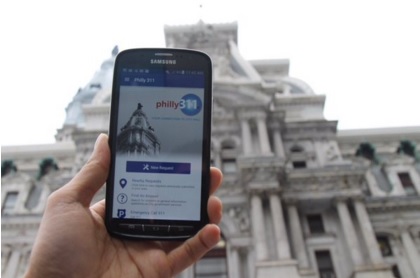
This is the fourth post in a series on “The Mobile Citizen,” a look at how the Civic Platform is helping agencies of all sizes engage their mobile citizens and stay ahead of the “mobile mind shift.”
——
Late last month, Winter Storm Jonas hit much of the east coast. From Friday, January 22 to Sunday, January 24, the storm affected 102.8 million people and covered about 434,000 square miles in 26 states, according to the NOAA.
For many local government officials, Winter Storm Jonas meant around-the-clock work to keep citizens safe, roads accessible and communication constant.
In Philadelphia, the nationally renowned Philly 311 call center received more than 21,000 calls (8x more than normal), nearly 8,000 requests via its Accela-powered mobile app and website and 6,000 requests through social media.
The efforts of the team behind Philly 311 are evidence of the changing nature of customer service in local government. Now more than ever, citizens want services to be fast and efficient and their communication with staff easy and convenient. There’s greater pressure on call centers to provide multiple channels for communication and leverage technology as necessary to meet these changing expectations.
Philly 311 proactively got the word out to citizens about the storm, continued to keep citizens up to date on the storm’s effects and was responsive across a multitude of channels.
The power of this new form of customer service is best encapsulated in Philly 311’s Twitter feed during the storm, a medium normally unassociated with local government customer service.
Nearly three days before major snowfall, Philly311 tweets out information on how to stay prepared:
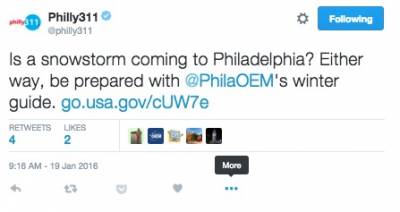
https://twitter.com/philly311/status/689496608455569408
Efforts to inform citizens on the pending storm continue on Twitter:
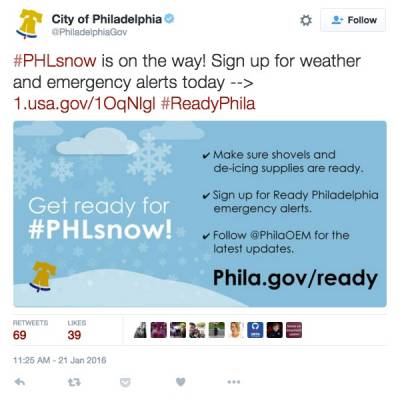
https://twitter.com/PhiladelphiaGov/status/690253959144042497
Using Twitter, Philly 311 shares transit information well in advance of the service suspension:
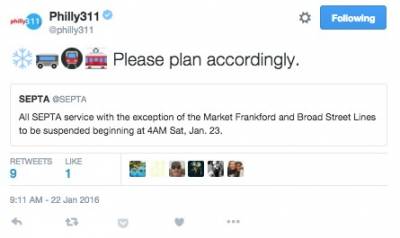
https://twitter.com/philly311/status/690582503049027586
Philly 311 maintains long hours during the storm, keeping citizens in the loop on when they can make non-emergency requests:
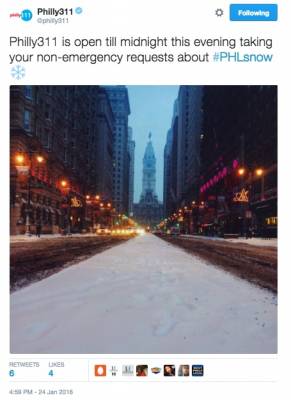 |
xxxxx | 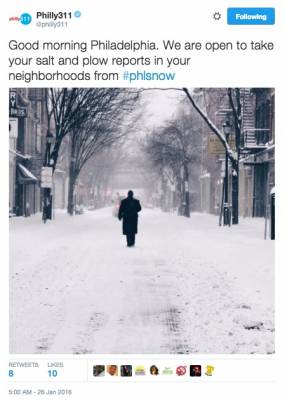 |
| https://twitter.com/philly311/status/691425218305396739 | https://twitter.com/philly311/status/691968865044189185 |
Philly 311 leverages social media to take requests — an example of extending its customer service reach to accommodate citizens:
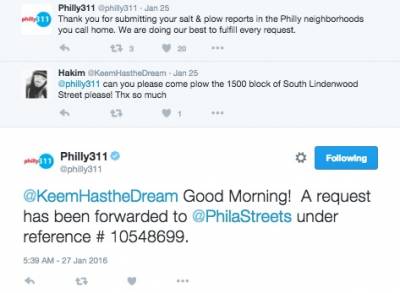
https://twitter.com/philly311/status/692341148648607745
After announcing it will take salting and plowing requests, Philly 311 promotes the mobile app as a way to submit a request. Offering multiple channels for request submission can help keep phone lines open for folks who need to call.
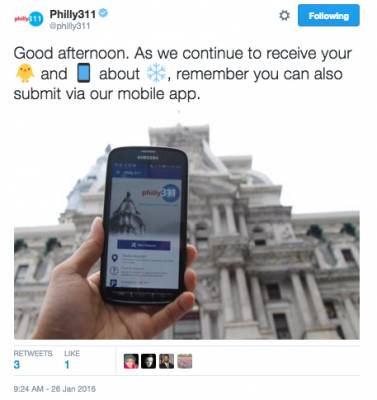
https://twitter.com/philly311/status/692035495929499649
The City’s official Twitter account confirms Jonas’ place in history. The City advises citizens to call 311 for non-emergencies, yet lo and behold, a citizen tweets a question to Philly 311…which promptly responds.
Proving that Philly 311 is open for business by phone, email, an app and…social media.
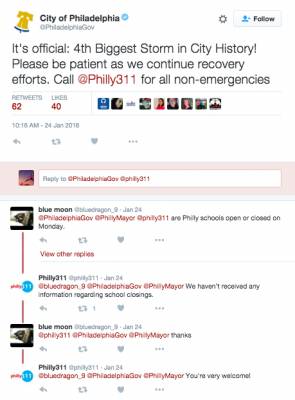
https://twitter.com/PhiladelphiaGov/status/691323785367179264
See first-hand how communities across the country are using Accela Citizen Relationship Management to improve their customer service efforts during next month’s Watch it Work Webinar on March 23!
RELATED POSTS:
The Mobile Citizen: Reach Them Where They Are (Part 1 of 4)
The Mobile Citizen: What Makes a Good Mobile Tool? (Part 2 of 4)
The Mobile Citizen: Accela, Construct API and…Lasagna? (Part 3 of 4)



